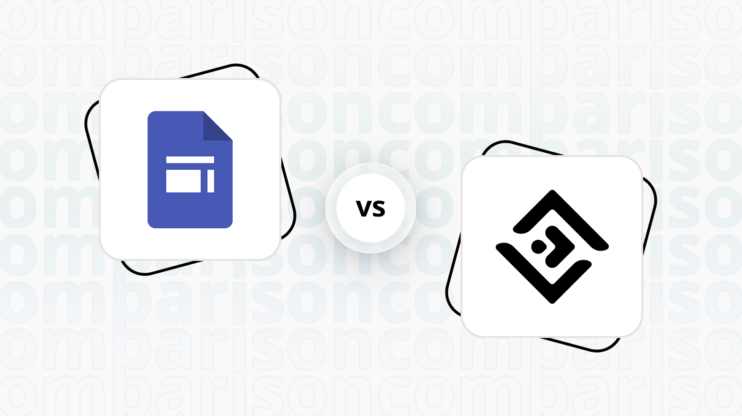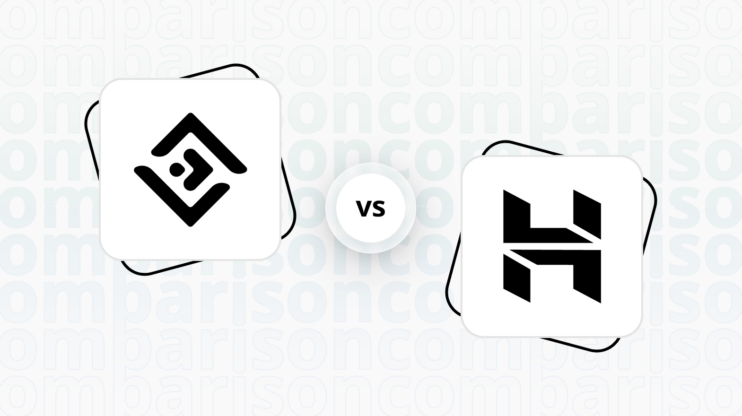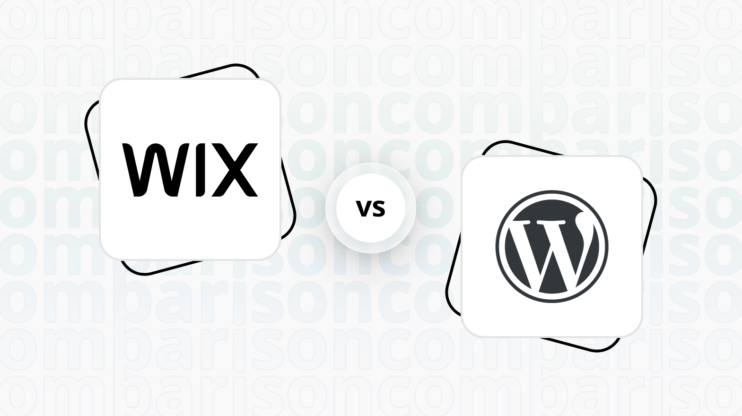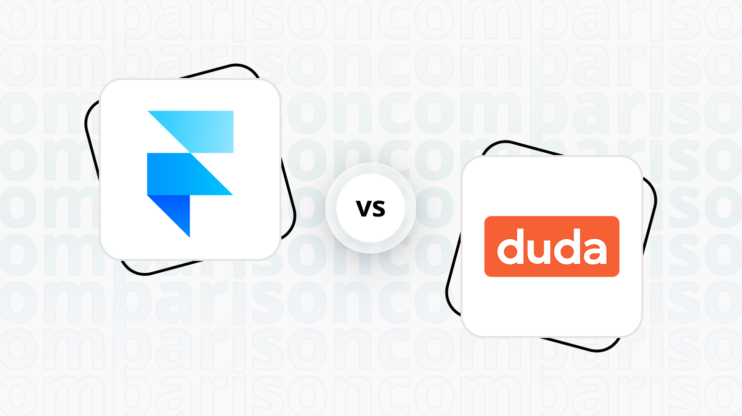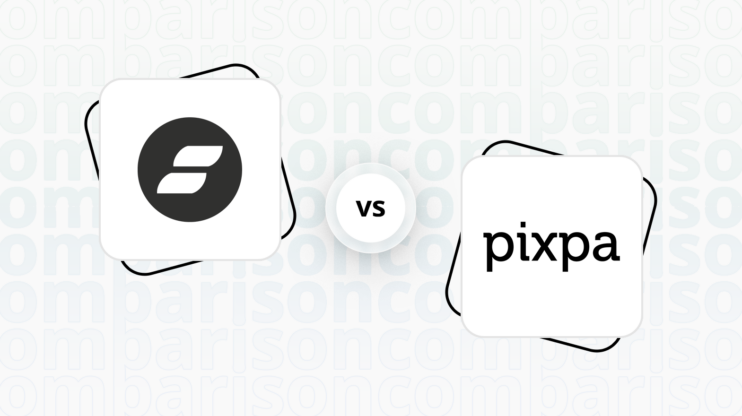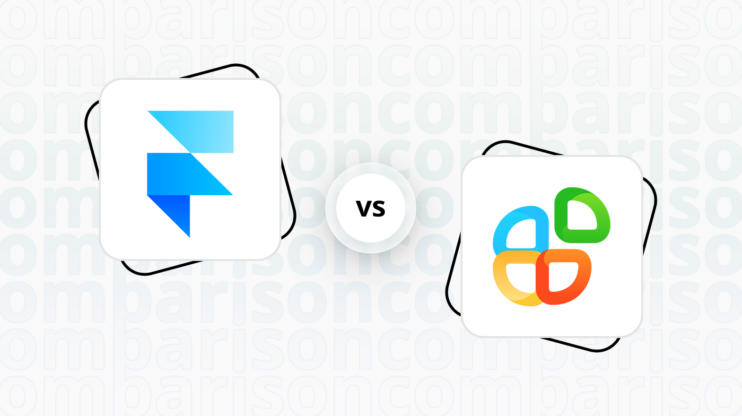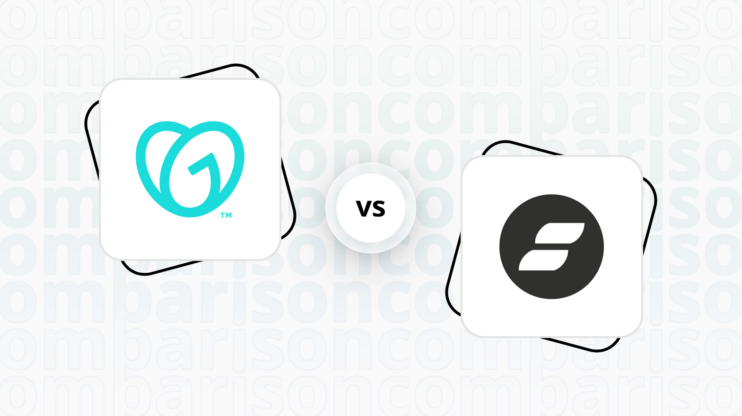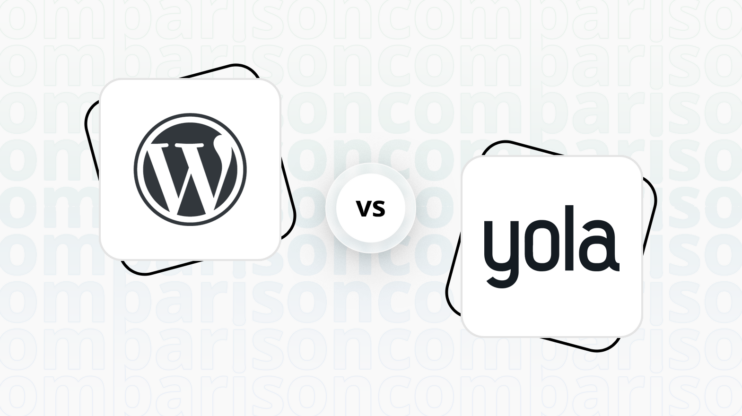Final verdict
Google Sites and Hostinger Website Builder cater to different user needs, with Hostinger taking a slight lead in overall functionality.
-
Google Sites (Overall Grade: 5.6/10)
is best suited for users looking for a simple, collaborative platform integrated with Google’s ecosystem. It excels in user management, security, and customer support, making it ideal for educational projects, team collaborations, and basic website needs. However, it falls short in ecommerce capabilities, website speed optimization, and AI features, limiting its appeal for more complex or business-oriented sites. -
Hostinger Website Builder (Overall Grade: 7.1/10)
stands out for users seeking a more comprehensive website building solution with ecommerce capabilities, superior website speed optimization, and innovative AI features. It offers a wider range of templates and marketing tools, making it a better fit for small to medium-sized businesses and users looking to create more dynamic, feature-rich websites.

|

|
|
|---|---|---|
|
Design functionalities & templates |
4.9 |
8.5 |
|
Ease of use |
8.3 |
8.3 |
|
Ecommerce |
1.8 |
6.1 |
|
Website Editors |
7.0 |
7.4 |
|
Product testing options |
6.9 |
6.7 |
|
Price |
8.1 |
9.0 |
|
Hosting quality |
8.2 |
7.2 |
|
Website speed optimization |
3.3 |
8.2 |
|
Plugins and integrations |
6.4 |
4.7 |
|
Marketing features |
2.6 |
5.8 |
|
Customer support |
7.2 |
7.2 |
|
Security |
9.3 |
8.2 |
|
AI capabilities |
0 |
6.1 |
|
User Management |
7.8 |
6.3 |
| Overall |
5.6 |
7.1 |
Best for ecommerce
 1.8
1.8
 6.1
6.1
Verdict
: For those looking to build an ecommerce site, Hostinger Website Builder offers a significantly more robust set of features compared to Google Sites.
-
Google Sites
: Lacks built-in ecommerce capabilities, relying on third-party integrations for any ecommerce functionality. It’s more suited for simple websites and not ideal for those looking to manage an online store directly within the platform. -
Hostinger Website Builder
: Provides a comprehensive suite of ecommerce features, including product catalog management, inventory management, and payment gateways, making it a far better choice for creating and managing an online store.
Best for informational & business websites
 7.2
7.2
 7.9
7.9
Verdict
: Hostinger Website Builder edges out Google Sites for informational and business websites, offering superior design flexibility and template variety.
-
Google Sites
: Ideal for users deeply integrated into the Google ecosystem, Google Sites offers simplicity and seamless collaboration. It’s best suited for basic informational sites where ease of use and Google service integration are priorities. -
Hostinger Website Builder
: With a higher score in design functionalities and templates, Hostinger Website Builder is the better choice for users seeking a more customized and visually appealing website. It provides a broader selection of templates and design options, catering to a wider range of business and informational website needs.
Detailed comparison
Design functionalities & templates
Design FunctionalitiesRepresents how well each platform allows for creative design and customization of websites.Score Components:
- Template Variety (30%): Range and quality of design templates.
- Customization (30%): Flexibility and options for design alterations.
- User Interface (20%): Ease and intuitiveness of the design process.
- Responsiveness (10%): Adaptability to different devices and screen sizes.
- Innovation (10%): Unique design features and tools.
 4.9
4.9
 8.5
8.5
🏆
Winner: Hostinger Website Builder.
If you’re looking for a platform that offers more creative control, a wide array of design features, and a larger number of templates, Hostinger Website Builder is the preferred choice.
Google Sites offers a limited number of templates suitable for various purposes, from personal blogs to business websites, with both free and premium options available. These templates are designed for user engagement, simplicity, and functionality, allowing for customization to meet specific needs. However, compared to other website builders like 10Web or Squarespace, Google Sites might offer less variety in templates and design customization options.
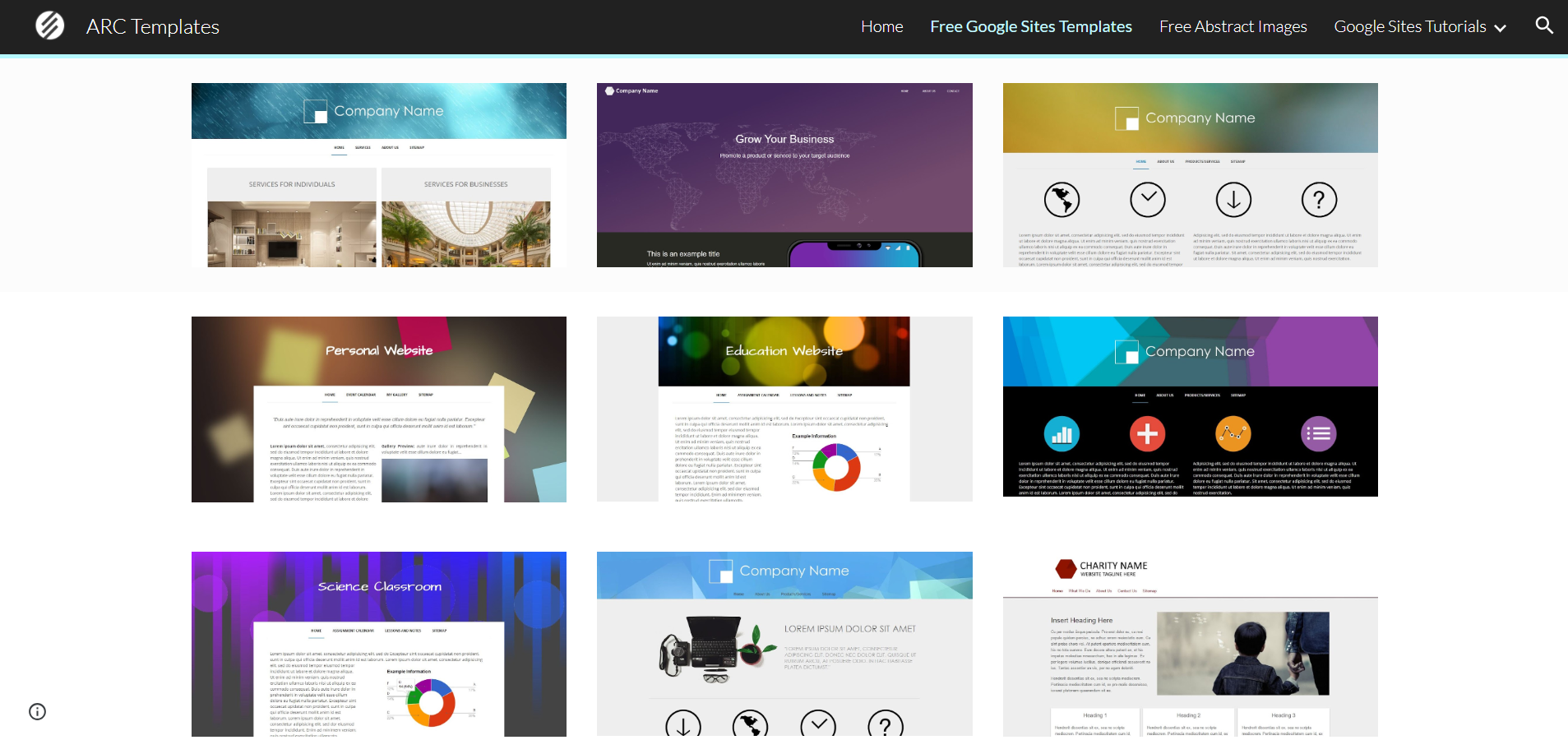

Compared to Google Sites, Hostinger Website Builder offers an extensive collection of over 140 templates across various categories, including business, portfolio, blog, ecommerce, restaurant, and landing pages. These templates are fully customizable, providing design flexibility with the ability to adjust colors, fonts, layouts, and incorporate unique brand elements, while ensuring mobile responsiveness for optimal viewing on all devices.
Hostinger Website Builder Themes
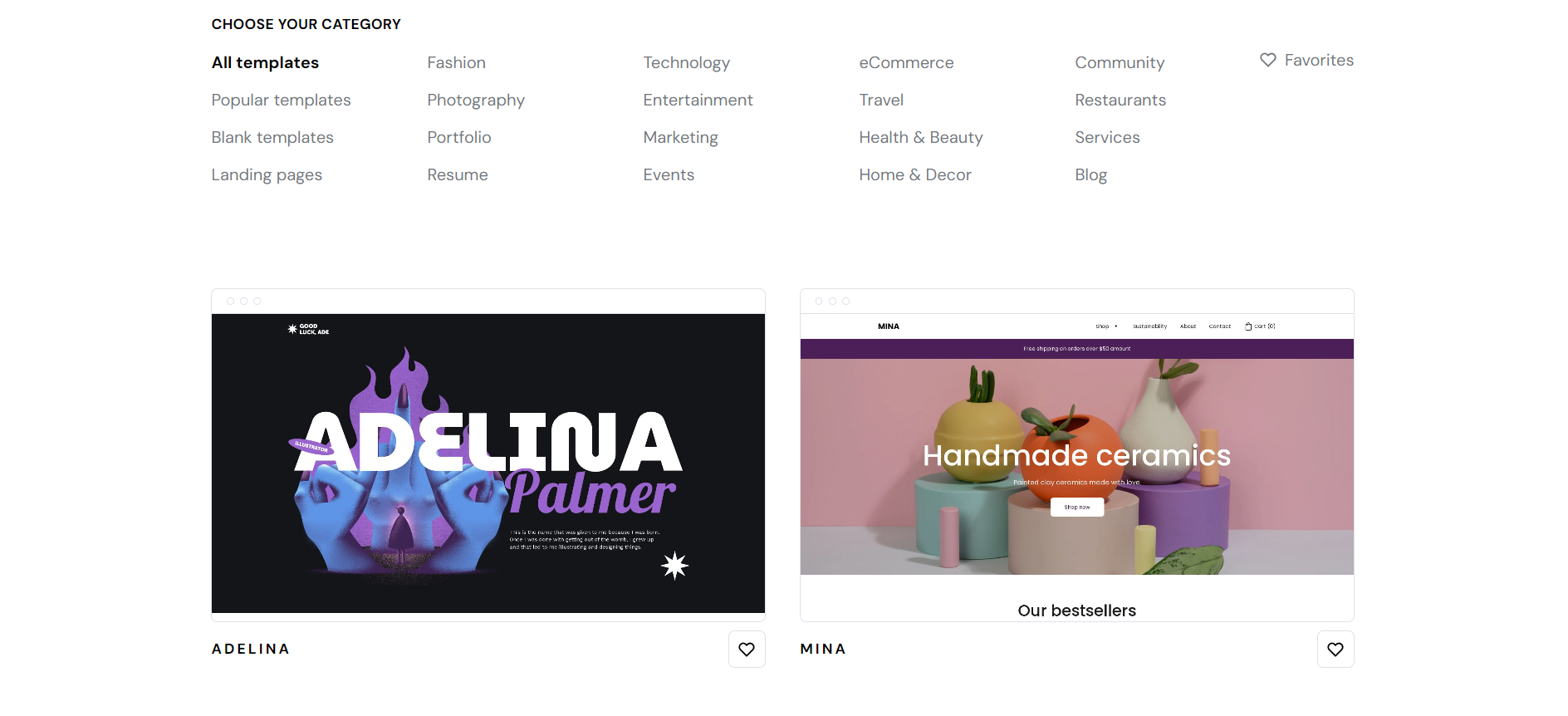

Get a head start on website creation with AI
Create a custom website tailored to your business needs 10X faster with 10Web AI Website Builder!
Ease of use
Ease of useReflects the platform’s overall user-friendliness.Score
Components:
- Learning curve (40%): Quickness and ease of getting started.
- Interface design (30%): Simplicity and intuitiveness of layout.
- User guidance (20%): Quality of tutorials and support.
- Flexibility (10%): Adaptability to various user skills.
 8.3
8.3
 8.3
8.3
🏆 Winner: Tie
. Both Google Sites and Hostinger Website Builder score an 8.3 in ease of use. Google Sites offers a user-friendly interface with seamless integration with other Google services, making it an efficient tool for creating basic websites. On the other hand, Hostinger Website Builder stands out with its user-friendly approach, featuring a drag-and-drop interface, real-time editing, a diverse template library, and AI-powered tools for beginners.
Learning Resources
🏆 Winner: Google Sites
. Google Sites offers a wide array of learning resources, from practical guides for educators to comprehensive digital skill development programs for the wider public. Hostinger Website Builder also offers a variety of well-crafted learning resources, but finding specific information within the extensive Help Center can be challenging.
For ecommerce
EcommerceMeasures the platform’s effectiveness in supporting online business activities.Score Components:
- Ecommerce themes and templates (20%): Variety and design of templates.
- Product management (25%): Ease of managing and organizing products.
- Payment options (25%): Variety and convenience of payment methods.
- Ecommerce features (20%): Features for managing an ecommerce store.
- Integration (10%): Compatibility with external e-commerce tools and services.
 1.8
1.8
 6.1
6.1
When it comes to ecommerce, Hostinger Website Builder has a clear advantage over Google Sites. While Google Sites does not have built-in ecommerce features, Hostinger Website Builder provides basic ecommerce capabilities, including product page creation, category management, payment integration, order processing, and promotional features.

|

|
|
|---|---|---|
|
Ecommerce themes and templates |
0.0 |
6.5 |
|
Product page customization |
0.0 |
5.8 |
|
Payment processing and commissions |
1.0 |
7.0 |
|
POS capabilities |
0.0 |
4.5 |
|
Payment gateways |
2.0 |
7.5 |
|
Product numbers |
0.0 |
6.0 |
|
Additional ecommerce features |
0.5 |
6.2 |
Google Sites ecommerce features:
Google Sites itself does not have built-in eCommerce features. However, you can integrate eCommerce functionalities into a Google Sites website by embedding third-party tools or widgets, linking to an external eCommerce platform, or using buttons that link to payment processors.
Hostinger Website Builder ecommerce features:
- Product Catalog Management
- Inventory management
- Taxes and shipping
- Payment gateways
- Order management
- Discount coupons and promotions
Ecommerce themes & templates
Google Sites does not have any ecommerce templates. On the other hand, Hostinger Website Builder provides over 50 ecommerce templates out of its library of 140+, covering various styles and industries. These mobile-responsive templates offer pre-built functionalities such as product pages, shopping carts, and wishlists, but compared to dedicated platforms, the selection may feel smaller, and customization options might be more limited.
Product page customization
Google Sites lacks any product page customization features, as the products can be listed with embedding third-party platforms, all the customization can be done within the mentioned platforms. In contrast, Hostinger Website Builder’s product page customization includes editing basic elements, adjusting layout and design, and optimizing SEO settings. However, compared to dedicated ecommerce platforms, it falls short in terms of flexibility due to limited code access, restrictions on creating entirely new custom sections, and theme-specific limitations.
Payment processing
You can integrate payment gateways into Google Sites using external tools or links, not through native features. This can be done by embedding HTML code for payment buttons from services like PayPal, Square, or Stripe, or by linking to an external checkout page. Third-party eCommerce widgets also offer a way to add payment functionalities. However, Google Sites doesn’t offer the comprehensive eCommerce capabilities that dedicated platforms provide.
On the other hand, Hostinger Website Builder provides basic ecommerce features, supporting popular payment gateways like PayPal, Stripe, and Square with no additional platform commissions on sales. However, it lacks built-in payment processing and integrated point-of-sale capabilities, necessitating reliance on third-party gateways and separate systems for in-person transactions. The platform supports various payment gateways, and users should refer to the Hostinger website for a comprehensive list based on their location and plan.
Website Editors
Website EditorsEvaluates the platforms’ website building and editing capabilities.Score Components:
- Customization tools (40%): Range and power of editing features.
- Editor usability (30%): User experience within the editor.
- Design flexibility (20%): Freedom in layout and design changes.
- Update and maintenance ease (10%): Simplicity of updating and maintaining the site.
 7.0
7.0
 7.4
7.4
🏆
Winner: Hostinger Website Builder
. With a score of 7.4, Hostinger Website Builder offers a beginner-friendly platform with a drag-and-drop interface, pre-designed templates, and visual aids for easy website creation. It provides various sections, content editing tools, SEO optimization, and ecommerce capabilities on premium plans. However, it has limitations in design flexibility compared to code-based platforms and may have fewer advanced features for high-volume stores. Customization options also vary based on the chosen plan.
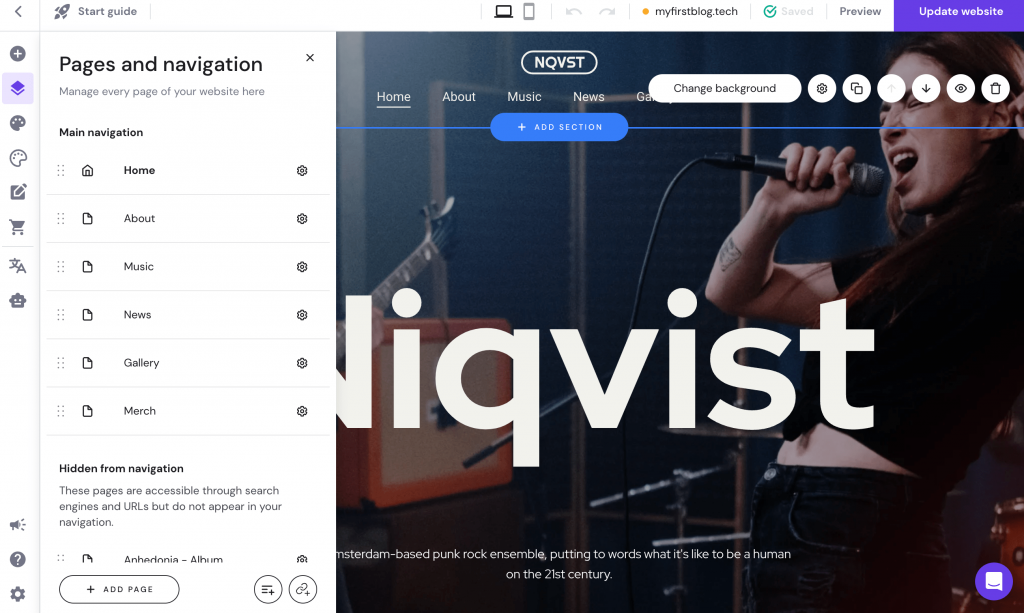
Google Sites, scoring 7.0, offers a user-friendly website builder editor that allows users to create and design websites without needing coding knowledge. With its drag-and-drop interface, users can easily add, customize, and arrange elements such as text, images, and videos on their web pages. It also provides a variety of templates and design options to help users get started quickly and ensure their site looks professional. Additionally, Google Sites integrates seamlessly with other Google services, enabling the incorporation of Google Docs, Sheets, Slides, and Maps directly into the website.
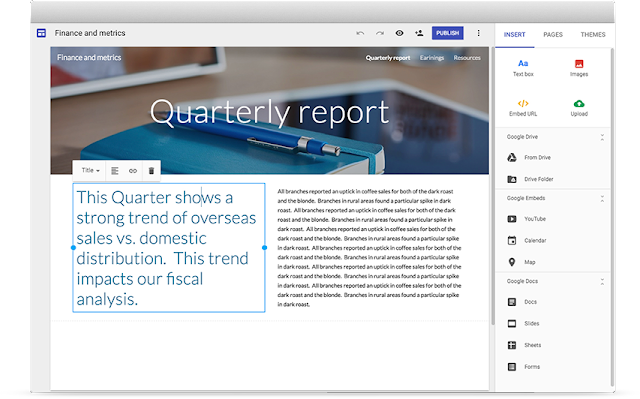
Mobile editor/app
 0
0
 5.5
5.5
🏆
Winner: Hostinger Website Builder
. Google Sites does not offer a mobile editor app, which can limit the flexibility and convenience for users who prefer to make changes to their website on the go. On the other hand, Hostinger Website Builder, while it doesn’t have a dedicated mobile editing app, offers a mobile-friendly interface that is directly accessible through your phone’s web browser. This allows users to make changes to their website from anywhere, providing a level of convenience that Google Sites does not offer.
Product testing options
Product Testing OptionsAssesses the options for trying out platform features before commitment.Score Components:
- Trial quality (40%): Extent and usefulness of the trial or free version.
- Feature accessibility (30%): How many features are available to test.
- Trial duration (20%): Length of the trial period.
- Ease of transition (10%): Smoothness of moving from trial to paid plans.
 6.9
6.9
 6.7
6.7
Overall Result
:
Google Sites wins
. Google Sites scores 6.9, slightly higher than Hostinger Website Builder’s 6.7. Google Sites offers a free version and a 14-day free trial, allowing users to test some premium features. On the other hand, Hostinger Website Builder does not offer a free or trial version, but it does provide a 30-day money-back guarantee, during which users can test premium features.

|

|
|
|---|---|---|
|
Free Plan |
Yes |
No |
|
Trial Duration |
14 days | No (30-day money-back guarantee) |
|
Testing Premium Features |
Some features during free trial | During 30-day refundable period |
|
Money Back Guarantee |
No |
Yes (30 days for all paid plans) |
Price
PriceLooks at the cost-effectiveness and value for money of each platform.Score Components:
- Plan value (40%): What each pricing tier offers.
- Transparency and clarity (30%): Clearness of pricing structures.
- Flexibility of plans (20%): Range of options to suit different budgets.
- Hidden costs (10%): Additional expenses not included in the plan.
 8.1
8.1
 9.0
9.0
Hostinger Website Builder offers more competitive pricing and a significant discount for annual subscriptions, while Google Sites provides a more comprehensive range of plans, including options for larger businesses and enterprises.

|

|
|
|---|---|---|
|
$5-$13 |
Business Starter ($7.20/month): This plan includes basic features suitable for individuals or small businesses, offering professional email through Gmail, 30GB of storage per user, and video meetings for up to 100 participants. It allows to manage 1 website and there is no limitation on number of pages. Value for price: 6.0 |
Premium website ($11.99/month): Build 1 website with 10 GB storage, 100 GB bandwidth, custom domain & email, social media integration & SEO tools. Value for price: 7.5 |
|
$13-$20 |
Business Standard ($14.40/month): Suitable for growing businesses, this plan provides 2 TB of storage per user, video meeting capacity for up to 150 participants with recording features, and access to smart booking pages and shared drives. It allows to manage 1 website and there is no limitation on number of pages. Value for price: 7.5 |
Business website builder ($13.99/month): Build 1 website with custom domain & emails, AI website builder, AI image generator, AI writer, ecommerce features, marketing integrations and 0% transaction fees Value for price: 8.5 |
|
$20+ |
Business Plus ($21.60/month): Designed for larger businesses needing more robust capabilities, offering 5 TB of storage per user, advanced security options, and video meetings for up to 500 participants. It allows to manage 1 website and there is no limitation on number of pages. Value for price: 8.5 |
No offering at this amount. |
location. As a result in rare cases the prices displayed here can differ from the ones you see on their
websites.
Hosting quality
Hosting
qualityExamines the reliability and performance of the hosting solutions.Score Components:
- Uptime (40%): Consistency and reliability of website availability.
- Speed (30%): Loading times and performance.
- Bandwidth and storage (20%): Sufficiency of resources provided.
- Data centers (10%): Quality and distribution of hosting infrastructure.
 8.2
8.2
 7.2
7.2
🏆
Winner: Google Sites
Google Sites offers cloud-based managed hosting with a 99.9% uptime guarantee and data centers across the globe. Hostinger Website Builder, while offering a variety of hosting types and a similar uptime guarantee, falls slightly behind in the hosting quality score.

|

|
|
|---|---|---|
|
Do they offer hosting? |
Yes, basic storage with 100MB free per site, can be increased by upgrading to Google Workspace |
Yes, plans come with generous storage and unmetered bandwidth, alongside automatic backups |
|
Data Centers: |
Google operates a total of 21 data centers across the globe: 2 in Asia, 5 in Europe, 13 in US and 1 in South America |
Data Centers across the globe: USA, Europe, Asia, South America |
|
Type of hosting: |
Cloud based managed hosting |
Shared Hosting, Cloud Hosting, WordPress Hosting, VPS Hosting |
|
Uptime: |
99.9% |
99.9% |
|
Uptime Guarantee: |
Yes, 99.9% |
Yes, 99.9% |
Website Speed Optimization
Website Speed OptimizationEvaluates optimization of website loading timesScore Components:
- PageSpeed Score (30%): Google’s score indicating performance optimization.
- Loading Time (30%): The average time until a website is fully interactive.
- Mobile Optimization (15%): Optimization effectiveness for mobile devices.
- Resource Optimization (15%): Optimizing images, scripts, and other heavy resources.
- CDN Usage (10%): Use of CDN to enhance speed across geolocations.
 3.3
3.3
 8.2
8.2
🏆 Winner: Hostinger Website Builder
Both Google Sites and Hostinger Website Builder prioritize website performance and page speed, but Hostinger Website Builder outperforms Google Sites in this aspect.

|

|
|
|---|---|---|
|
Focus |
Automated Optimization, CDN, Mobile Optimization, Browser Caching, Code Minification, Use of AMP |
LiteSpeed Cache, Cloudflare CDN, MariaDB database, Browser caching |
|
Performance Tools |
Google Lighthouse, PageSpeed Insights |
Google PageSpeed Insights Integration |
|
Key Strategies |
Automated Optimization, CDN, Mobile Optimization, Browser Caching, Code Minification, Use of AMP |
LiteSpeed Cache, Cloudflare CDN, MariaDB database, Browser caching |
|
Load Times |
Google does not disclose statistics about website Page Speed scores, or load times |
2-3 seconds average |
|
Page Speed Scores Range |
Google does not disclose statistics about website Page Speed scores, or load times |
80-95+/100 |
|
Core Web Vitals Improvement |
Emphasis on LCP, FID, CLS improvements |
Notable strides in enhancing Core Web Vitals (CWV) performance, including reducing Largest Contentful Paint (LCP) through LiteSpeed Cache and Cloudflare CDN, improving First Input Delay (FID) with server-side optimizations, and minimizing Cumulative Layout Shift (CLS) through CSS optimizations |
Hostinger Website Builder has made significant strides in enhancing website performance and page speed. It uses LiteSpeed Cache, Cloudflare CDN, and MariaDB database for speed optimization, and has an average load time of 2-3 seconds. Its PageSpeed scores range from 80 to 95+/100. Hostinger has also made notable strides in enhancing Core Web Vitals (CWV) performance, including reducing Largest Contentful Paint (LCP), improving First Input Delay (FID), and minimizing Cumulative Layout Shift (CLS).
Google Sites, on the other hand, uses automated optimization, CDN, mobile optimization, browser caching, code minification, and AMP for speed optimization. However, Google does not disclose statistics about website Page Speed scores or load times. It places an emphasis on improving LCP, FID, and CLS.
Get a head start on website creation with AI
Create a custom website tailored to your business needs 10X faster with 10Web AI Website Builder!
Plugins and integrations
Plugins and integrationsMeasures the range and effectiveness of additional plugins and integrations.Score Components:
- Variety of options (40%): Range of available add-ons.
- Integration smoothness (30%): Ease of integrating plugins into the site.
- Quality of plugins (20%): Functionality and reliability of the options.
- Custom integration capabilities (10%): Support for custom or third-party integrations.
 6.4
6.4
 4.7
4.7
🏆 Winner: Google Sites.
Google Sites scores 6.4, offering a wide array of plugins and extensions to enhance website functionality. It integrates with various services like Elfsight and Common Ninja, providing functionalities like social media feeds, review displays, chat support, e-commerce tools, and various interactive widgets. On the other hand, Hostinger Website Builder, with a score of 4.7, relies on add-ons for additional functionality, offering around 20 free options in categories such as marketing, forms, website functionality, design, and SEO. While it covers a wide spectrum of features, Google Sites offers more extensive options, making it the winner in this category.

Marketing Features
Marketing featuresAssesses tools and options available for marketing.Score Components:
- SEO tools (40%): Effectiveness of SEO features.
- Marketing automation (30%): Availability and quality of marketing tools.
- Social Media integration (20%): Ease and depth of social media connectivity.
- Email marketing (10%): Quality and usability of email marketing tools.
 2.6
2.6
 5.8
5.8
🏆
Overall Winner: Hostinger Website Builder
. Hostinger Website Builder offers a wider range of marketing features, including SEO tools, email marketing, blogging, social media integration, and basic analytics. Google Sites, while offering basic SEO and social media integration, lacks in areas like email marketing, blogging, and ads and promotions.

|

|
|
|---|---|---|
|
SEO Tools |
Basic SEO settings | Comprehensive SEO tools |
|
Email Marketing |
No | Integration with third-party services |
|
Blogging |
No | Built-in blog section |
|
Social Media Integration |
Embed social media links and widgets | Social media links and sharing options |
|
Analytics and Reporting |
Google Analytics integration | Basic analytics for website traffic and performance |
|
Ads and Promotions |
No | Supports integrations for ad management |
Customer Support
Customer supportEvaluates the quality and availability of support options.Score Components:
- Response time (40%): Speed of support responses.
- Support quality (30%): Effectiveness and helpfulness of the support.
- Availability (20%): Range of support channels (phone, chat, email).
- Resource richness (10%): Quality of self-help and educational materials.
 7.2
7.2
 7.2
7.2
🏆 Winner: Google Sites
. Both Google Sites and Hostinger Website Builder offer a variety of customer support options, but Google Sites takes the lead with its more comprehensive support for Google Workspace customers. Google Sites provides 24/7 support for critical issues and the option to upgrade to enhanced and premium support levels.
On the other hand, Hostinger provides 24/7 live chat, email responses within 24 hours, and phone support during specified hours in specific regions. However, Hostinger does not offer an enterprise plan, which gives Google Sites an edge in this category.
Security
SecurityLooks at the platforms’ security measures and data protection.Score Components:
- Data protection (40%): Safeguards for user and customer data.
- SSL and encryption (30%): Implementation of secure connections.
- Compliance (20%): Adherence to industry security standards.
- Regular updates (10%): Frequency of security updates and patches.
 9.3
9.3
 8.2
8.2
🏆
Winner: Google Sites
. Google Sites, part of the Google Workspace, offers robust security measures including data encryption, two-factor authentication, automatic malware scanning, and compliance with international data protection standards. It also benefits from Google’s regular security updates and DDoS protection, ensuring a secure environment for website creators and visitors.
Hostinger Website Builder also prioritizes security with regular updates, advanced firewalls, DDoS protection, and anti-malware scans. However, it falls slightly short in comparison to Google Sites, particularly in terms of private data storage and protection. Users need to be more cautious about compliance with data privacy regulations and managing and protecting visitors’ data on their websites when using Hostinger.
AI Capabilities
AI capabilitiesMeasures the effectiveness of AI-driven features and tools.Score Components:
- Automation efficiency (40%): Impact of AI on streamlining processes.
- Personalization (30%): AI-driven customization for users or customers.
- AI-Assisted design (20%): Role of AI in website design and functionality.
- Data analysis (10%): Use of AI in interpreting user data and analytics.
 0
0
 6.1
6.1

|

|
|
|---|---|---|
|
Website Layout Generation |
|
Hostinger’s AI generates website layouts |
|
Content Creation |
|
AI Writer tool for quick and easy content creation |
|
Ecommerce Features |
|
AI Shop Generator, automated product descriptions, smart stock management |
|
Additional AI Features |
|
AI Image Generator, AI Logo Maker, AI Heatmap, SEO Check tool |
🏆 Winner: Hostinger Website Builder
. Hostinger Website Builder, with a score of 6.1, utilizes AI to automate aspects of website creation, including layout generation, content creation, and ecommerce features. It also offers additional AI tools for image generation, logo suggestions, visitor behavior analysis, and SEO improvement.
Google Sites, with a score of 0, does not have any AI capabilities. It is a structured web page-creation tool that allows users to build websites using a drag-and-drop interface, but it does not utilize AI to enhance or automate any aspects of the website creation process.
User Management
User ManagementAssesses the platforms’ capabilities in managing user roles, permissions, and accessibility.Score Components:
- Role Customization (40%): Flexibility in creating and defining user roles and
permissions. - Ease of Management (30%): User interface and tools for managing users.
- Access Control (20%): Effectiveness of access control measures for different user
levels. - Scalability (10%): Ability to manage a growing number of users efficiently.
 7.8
7.8
 6.3
6.3
🏆 Winner: Google Sites
. Google Sites and Hostinger Website Builder offer different approaches to user management.
- Google Sites allows multiple users to collaborate with different roles, including Owners, who have full control, and Editors, who can modify content but not site settings. There’s no strict limit on the number of users who can edit a site, allowing flexibility in management and development. Viewers can only see the site, with no editing permissions. This structure supports collaborative website building with varied levels of access and control for different users.
- The number of users who can edit a Hostinger website depends on the hosting plan and the Website Builder edition chosen. For shared hosting, the Free plan allows only 1 user, Starter allows 2, Premium allows 5, and Business offers unlimited collaborators. In Cloud Hosting, Startup allows 2, Professional allows 5, and Enterprise offers unlimited collaborators. The Website Builder Pro edition, available on all plans, allows up to 10 collaborators.
Unfortunately, there is no detailed information about user roles and access levels for both Google Sites and Hostinger Website Builder.
Additional Features

|

|
|
|---|---|---|
|
SSL Certificate |
|
|
|
Custom Domain |
|
|
|
Free Custom Domain Included |
|
|
|
International Domains |
|
|
|
Mobile Responsive |
|
|
|
Page Speed |
|
|
|
Website Builder Mobile App |
|
|
|
Convert a Website To An App |
|
|
|
Website Analytics |
|
|
|
Multilingual Sites |
|
|
|
Multiple Users |
|
|
User Feedback
Google Sites, part of the Google Workspace, is consistently praised by users for its seamless integration, ease of use, and collaborative features. It’s a popular choice for various professional and educational needs. The platform’s simplicity and user-friendly interface are lauded, enabling effortless website creation and sharing of information within organizations. While some users desire more customization options and additional features, overall, Google Workspace remains highly valued for its versatility and streamlined workflow facilitation.
On the other hand, Hostinger Website Builder is favored for its ease of use, affordability, and strong customer support, making it an attractive option for users, especially those new to website building. However, there are areas for improvement, particularly in offering more diverse templates, enhancing ecommerce features, and streamlining customer support responsiveness. These insights reflect a balance of satisfaction with areas that could benefit from further development.
The making of this blog
We followed a clear, step-by-step process to write and research this article.
FAQ
Which platform is better for beginners, Google Sites or Hostinger Website Builder?
Can I use both Google Sites and Hostinger Website Builder for ecommerce?
How do Google Sites and Hostinger Website Builder compare in terms of design flexibility and template variety?
What are the major differences in pricing between Google Sites and Hostinger Website Builder?
Which platform offers better website speed optimization?
Can I integrate plugins and third-party services with Google Sites and Hostinger Website Builder?
Which platform has better customer support?
How do the platforms compare in terms of security?
Which platform is better for managing multiple users?










